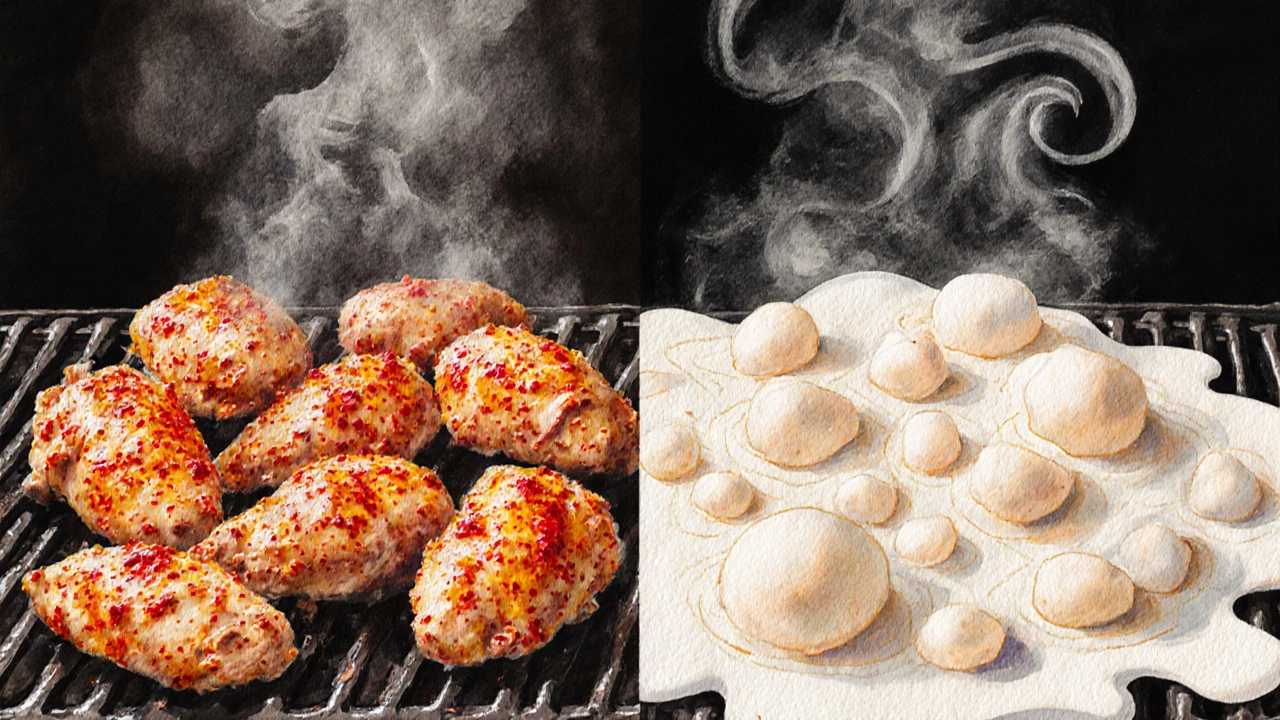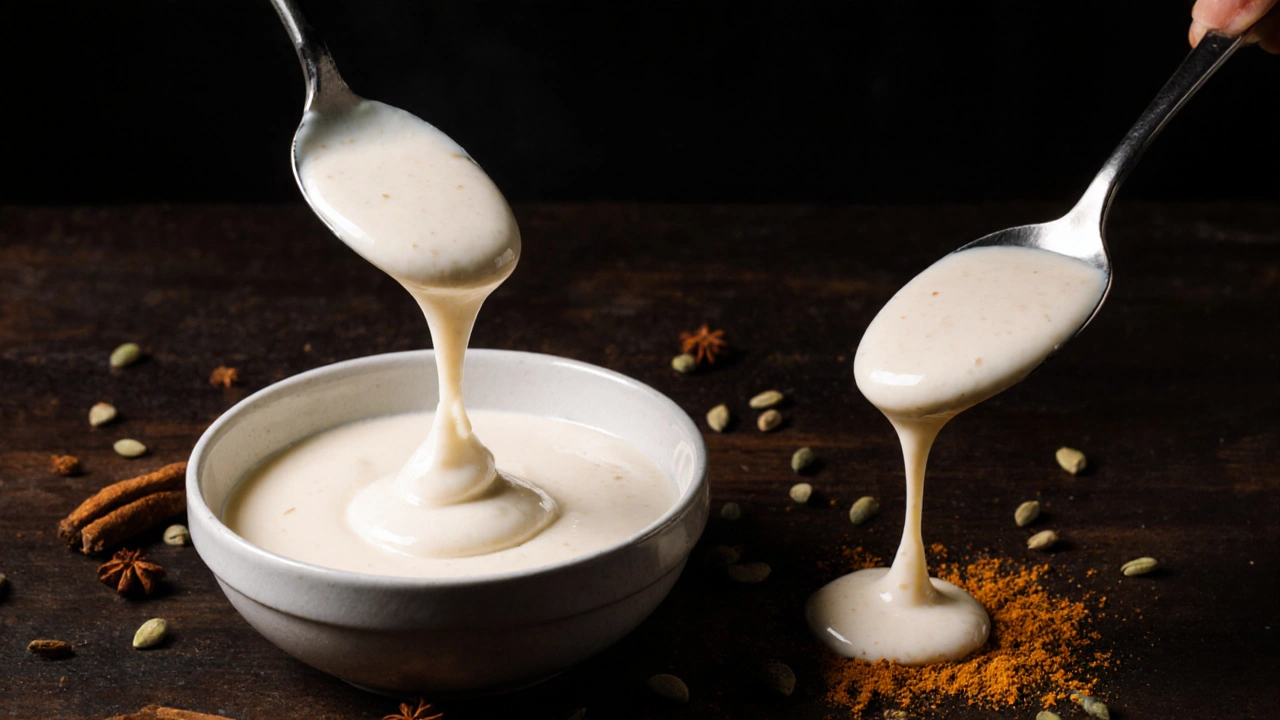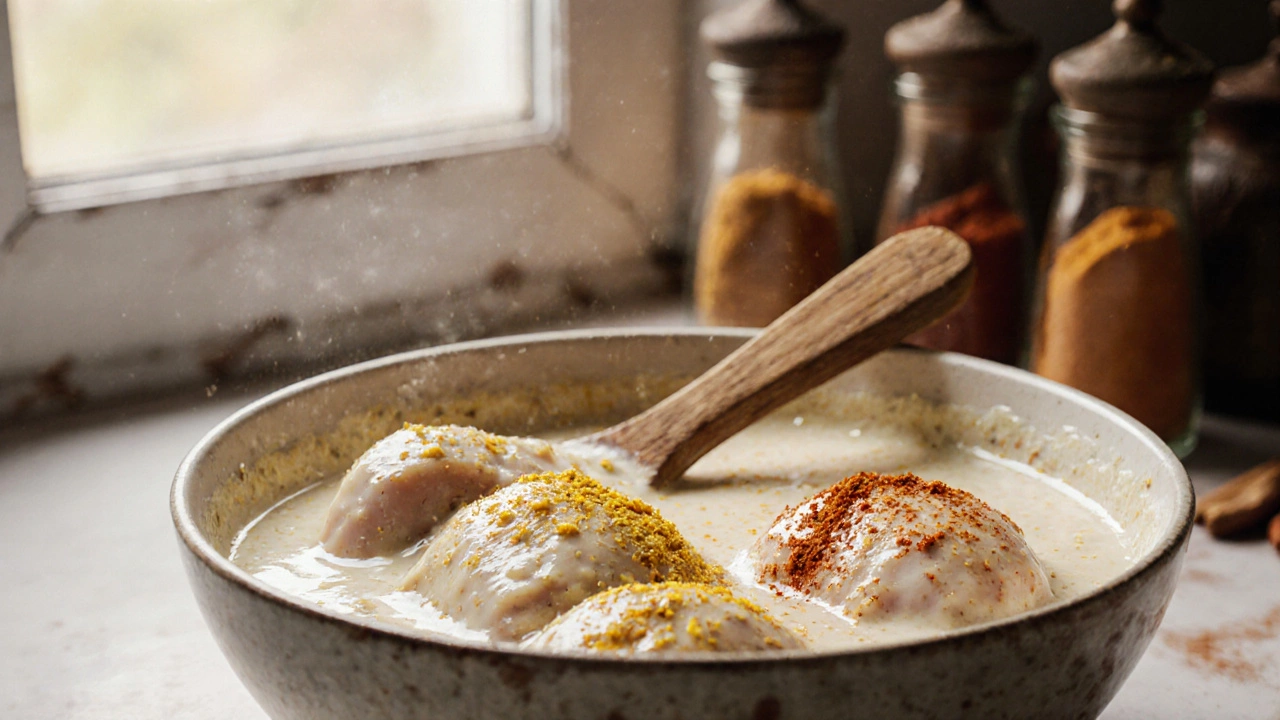Yogurt to Sour Cream Substitution Calculator
How to Use This Tool
Enter the amount of yogurt your recipe calls for. This calculator will tell you exactly how much sour cream to use and how much liquid to add to match the right consistency.
Substitution Calculator
Your Substitution Guide
Add 2-3 tablespoons of water or lemon juice to achieve the right consistency
Important Tips
• Always thin sour cream before using – otherwise your marinade won't coat evenly • Marinate for no more than 12 hours (sour cream can make chicken mushy) • Use medium-high heat when cooking (sour cream browns faster than yogurt) • Not suitable for authentic tandoori chicken - may alter flavor profile
Ever found yourself halfway through making tandoori chicken, only to realize you’re out of yogurt? You’ve got sour cream in the fridge, and you’re wondering - can you swap it in? The short answer is yes, you can. But it’s not a 1:1 swap, and if you don’t adjust for it, your chicken might end up too rich, too dense, or not tender enough.
Why Yogurt Works So Well for Chicken Marinades
Yogurt isn’t just a base for flavor in tandoori chicken - it’s a tenderizer. The lactic acid in plain, unsweetened yogurt gently breaks down the proteins in chicken, making it juicy and soft after grilling or baking. It also helps spices cling to the meat. A typical tandoori marinade uses 1 to 1.5 cups of plain yogurt per pound of chicken, mixed with garlic, ginger, lemon juice, cumin, coriander, turmeric, and chili powder.
The texture matters too. Yogurt is thin enough to coat evenly but thick enough to stick. It doesn’t add fat, so the chicken doesn’t get greasy. And because it’s fermented, it adds a subtle tang that balances the spices.
Sour Cream: What It Brings to the Table
Sour cream is made the same way as yogurt - through bacterial fermentation - but it’s made from cream, not milk. That means it’s about 20% fat, compared to yogurt’s 3-5%. That higher fat content changes everything.
On the plus side, sour cream adds richness. It makes the marinade creamier, which can help keep chicken moist under high heat. It also has lactic acid, so it still tenderizes - just slower and less aggressively than yogurt.
But here’s the catch: sour cream is thicker. It doesn’t spread as easily. If you use it straight from the tub, you’ll end up with clumps of sauce that don’t penetrate the meat. And because it’s so rich, it can make the final dish feel heavy, especially if you’re using it in a traditional tandoori style where the chicken is meant to be bright, spicy, and light.
How to Swap Sour Cream for Yogurt (The Right Way)
You can use sour cream, but you need to thin it out. Here’s how:
- Start with 3/4 cup of sour cream for every 1 cup of yogurt called for in the recipe.
- Add 2-3 tablespoons of water or lemon juice to loosen it up. Stir until it reaches the consistency of thick Greek yogurt.
- Keep the rest of your spices the same - garlic, ginger, cumin, paprika, turmeric, and a pinch of garam masala.
- Marinate for at least 4 hours, but no more than 12. Sour cream’s higher fat content can make chicken mushy if left too long.
- When cooking, use medium-high heat. Sour cream browns faster than yogurt, so watch for color changes. You want golden, not charred.
One real-world test: I made two batches of tandoori chicken - one with full-fat plain yogurt, the other with thinned sour cream. Both were tender. But the yogurt version had a cleaner spice profile. The sour cream batch tasted richer, almost like a creamy tikka masala, which isn’t bad - just different.

What Happens If You Use Sour Cream Straight?
Don’t skip the thinning step. If you use full-fat sour cream without diluting it:
- The marinade won’t coat the chicken evenly - you’ll get patches of sauce and dry spots.
- The fat can separate during cooking, leaving greasy residue on the grill or baking sheet.
- The chicken may not brown properly because the thick layer insulates the surface.
- Flavor becomes muffled. Sour cream’s tang gets lost under its own richness.
One home cook in Wellington told me she tried it once without thinning. Her chicken came out tasting like “spicy whipped cream on meat.” She hasn’t tried it again.
Other Substitutes You Can Try
If you don’t have yogurt or sour cream, here are a few other options:
- Buttermilk - the best alternative. Same acidity as yogurt, thinner texture. Use 1 cup per pound of chicken. Marinate for 2-6 hours.
- Cottage cheese (blended) - blend 1 cup cottage cheese with 2 tablespoons water until smooth. It’s close to yogurt in protein and acid, but lacks the tang. Add a splash of lemon juice.
- Coconut milk (unsweetened) - works for a tropical twist. It won’t tenderize as well, but it adds creaminess. Use with extra lime juice and spices.
- Plain kefir - similar to yogurt but more liquid. Use 1:1, but reduce marinating time to 3-4 hours.
None of these will give you the exact same result as yogurt. But if you’re stuck, they’re better than nothing.

When Not to Use Sour Cream
There are times when sour cream is a bad idea:
- If you’re making authentic tandoori chicken - the dish is meant to be bright, smoky, and slightly tart. Sour cream mutes that.
- If you’re cooking for someone who’s watching fat intake - sour cream adds nearly 50% more fat than yogurt.
- If you’re using bone-in chicken pieces - the fat in sour cream can prevent heat from penetrating evenly, leading to undercooked spots.
Stick to yogurt if you’re going for tradition. But if you’re experimenting, or just need a quick fix, sour cream - properly adjusted - won’t ruin your meal.
Pro Tip: Test the Consistency Before You Marinate
Before you dump the marinade over your chicken, do a quick test. Dip a spoon in, then lift it up. If the marinade drips off in a slow, steady stream - it’s ready. If it’s gloopy and clings in a blob, thin it with water or lemon juice. If it runs too fast, add a spoonful of sour cream or Greek yogurt to thicken it.
This small step saves you from a soggy or unevenly cooked batch.
Final Thoughts
Can you use sour cream instead of yogurt to marinate chicken? Yes - and you’ll still get delicious results. But you’re not replacing yogurt. You’re creating a new version of the dish. One that’s richer, creamier, and slightly more indulgent.
If you’re cooking for family or friends who love bold flavors, they might not even notice the difference. But if you’re aiming for the classic tandoori taste - the one you get at a good Indian restaurant - stick with plain yogurt. It’s the original for a reason.
Keep sour cream in your pantry for when you’re in a pinch. But don’t think of it as a substitute - think of it as a variation. And sometimes, a variation is just what you need.
Can I use sour cream instead of yogurt for tandoori chicken?
Yes, you can use sour cream, but you need to thin it with water or lemon juice first. Use 3/4 cup sour cream for every 1 cup of yogurt, and add 2-3 tablespoons of liquid to match the consistency of plain yogurt. This helps it coat the chicken evenly and prevents the marinade from becoming too rich or greasy.
Does sour cream tenderize chicken like yogurt?
Yes, sour cream does tenderize chicken because it contains lactic acid, just like yogurt. But because it’s thicker and higher in fat, the tenderizing effect is slower and less aggressive. Marinate for no longer than 12 hours to avoid mushy texture.
What happens if I use sour cream without thinning it?
If you use full-fat sour cream straight from the tub, it won’t coat the chicken evenly. The fat can separate during cooking, leaving greasy spots. The chicken may not brown well, and the spices won’t stick properly. The final dish can taste heavy and dull, losing the bright, spicy character of tandoori chicken.
Is sour cream healthier than yogurt for marinating chicken?
No. Plain yogurt has about 3-5% fat, while sour cream is around 20%. That means sour cream adds nearly four times the fat per tablespoon. If you’re watching calories or saturated fat, yogurt is the better choice. But if you’re not concerned, sour cream adds a rich flavor that some people prefer.
Can I use Greek yogurt instead of regular yogurt?
Yes, Greek yogurt works great - it’s thicker than regular yogurt but still has the right acidity and protein to tenderize chicken. If it’s too thick, thin it with a tablespoon of water or lemon juice. It’s actually a better option than sour cream if you want a richer texture without the extra fat.
What’s the best substitute for yogurt if I have none at all?
Buttermilk is the best substitute - it’s close in acidity and texture. Use it 1:1 for yogurt. Blended cottage cheese with a splash of lemon juice also works. Avoid sweetened yogurts, cream cheese, or mayonnaise - they’ll ruin the flavor and texture of your marinade.
